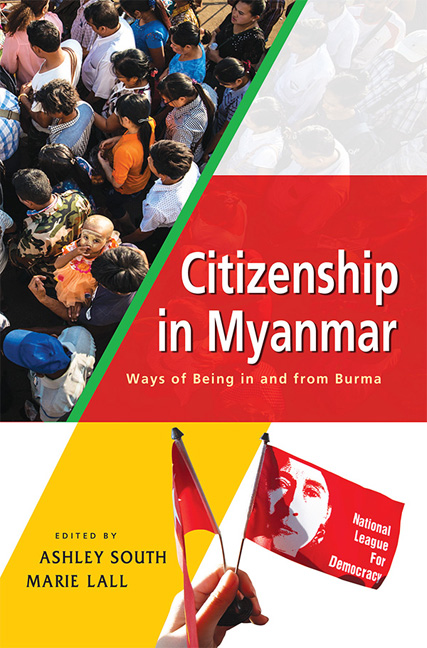Book contents
- Frontmatter
- Dedication
- Contents
- Foreword
- The Contributors
- Map of Myanmar
- Introduction
- 1 Ethnic Politics and Citizenship in History
- 2 Representation and Citizenship in the Future Integration of Ethnic Armed Actors in Myanmar/Burma
- Special Contribution: The Way Forward for Peace, Stability and Progress in Burma/Myanmar
- 3 National Political Dialogue and Practices of Citizenship in Myanmar
- 4 Citizenship and Minority Rights: The Role of “National Race Affairs” Ministers in Myanmar's 2008 Constitution
- Special Contribution: Karenni People at a Glance
- 5 Myanmar's Youth and the Question of Citizenship
- Special Contribution: I Am a Citizen of Myanmar
- 6 “The Value of Life”: Citizenship, Entitlement and Moral Legibility in Provincial Myanmar
- Special Contribution: How I Became Shan
- 7 Conflict and Mass Violence in Arakan (Rakine State): The 1942 Events and Political Identity Formation
- 8 Exploring the Issue of Citizenship in Rakhine State
- Special Contribution: Rohingya and Nationality Status in Myanmar
- 9 Myanmar's Other Muslims: The Case of the Kaman
- Special Contribution: Interview with P'doh Kweh Htoo Win
- Index
6 - “The Value of Life”: Citizenship, Entitlement and Moral Legibility in Provincial Myanmar
Published online by Cambridge University Press: 28 June 2018
- Frontmatter
- Dedication
- Contents
- Foreword
- The Contributors
- Map of Myanmar
- Introduction
- 1 Ethnic Politics and Citizenship in History
- 2 Representation and Citizenship in the Future Integration of Ethnic Armed Actors in Myanmar/Burma
- Special Contribution: The Way Forward for Peace, Stability and Progress in Burma/Myanmar
- 3 National Political Dialogue and Practices of Citizenship in Myanmar
- 4 Citizenship and Minority Rights: The Role of “National Race Affairs” Ministers in Myanmar's 2008 Constitution
- Special Contribution: Karenni People at a Glance
- 5 Myanmar's Youth and the Question of Citizenship
- Special Contribution: I Am a Citizen of Myanmar
- 6 “The Value of Life”: Citizenship, Entitlement and Moral Legibility in Provincial Myanmar
- Special Contribution: How I Became Shan
- 7 Conflict and Mass Violence in Arakan (Rakine State): The 1942 Events and Political Identity Formation
- 8 Exploring the Issue of Citizenship in Rakhine State
- Special Contribution: Rohingya and Nationality Status in Myanmar
- 9 Myanmar's Other Muslims: The Case of the Kaman
- Special Contribution: Interview with P'doh Kweh Htoo Win
- Index
Summary
After decades of authoritarian rule aimed at ring-fencing everyday people from contentious politics, Myanmar's November 2015 elections saw widespread popular re-engagement with party politics. With the shift from the spectacle of boisterous election campaigning to elite-level negotiation of national political transformation, expectations of what an incoming government can and will deliver for citizens — as well as the ethnic, religious and moral parameters of “the nation” — for many remain deeply rooted in notions of virtuous or moral citizenship popularized through the work of welfare groups and civil society permitted to develop during the dark days of military rule. In this chapter I explore the key social, political and moral ideas that animate people who offer their time, money and resources for these allegedly “apolitical” welfare groups that play an essential role in care for the needy throughout contemporary Myanmar.
Drawing on participant observation and interview research in central Myanmar conducted throughout 2015 with largely Buddhist welfare groups, their beneficiaries and their larger networks of donors, I challenge the fiction that these groups eschew “politics” or operate only in the allegedly “personal” domain of “religion”. Building on Andrea Muehlebach's (2012) exploration of citizenship and morality amongst volunteer welfare organizations in austerity Italy, I conceive of these notions, institutions and practices of non-state welfare provision in Myanmar as forms of “moral citizenship”. I argue that the exercise of this spiritually imbued citizenship is helping to generate political identities and frames of reference not just about entitlement to social assistance from the state but also about the need to assert and protect Buddhism at a time of rapid social and political transition in Myanmar. These ideas about compassionate citizenship become the basis for excluding minorities from foundational notions of “national values”, with virtuousness of their social work compared online and offline with the extremist violence committed by groups such as Islamic State in the Middle East and suggestively tied to Myanmar's own Muslim communities.
The chapter opens with a vignette of blood donations in central Myanmar, before then exploring how the scope of social action for others (parahita) in the Buddhist moral universe expanded significantly during the 1990s through the proliferation of Buddhist welfare groups. The notions of moral obligation and entitlement deployed by volunteers, beneficiaries and their extensive networks in contemporary Myanmar is then examined through ethnographic work with these welfare groups and their interaction with the state.
- Type
- Chapter
- Information
- Citizenship in MyanmarWays of Being in and from Burma, pp. 167 - 187Publisher: ISEAS–Yusof Ishak InstitutePrint publication year: 2017



